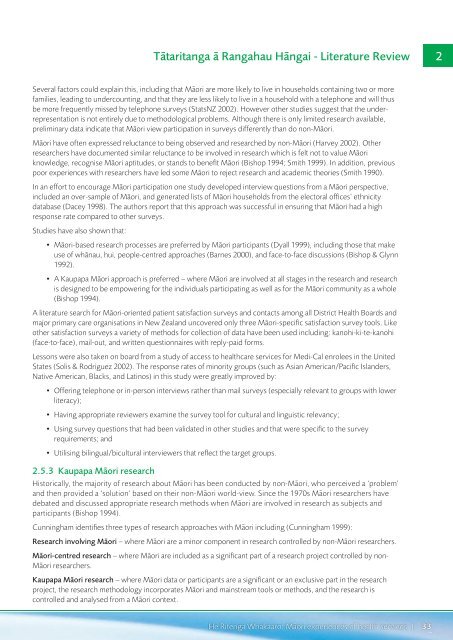He Ritenga Whakaaro - New Zealand Doctor
He Ritenga Whakaaro - New Zealand Doctor
He Ritenga Whakaaro - New Zealand Doctor
You also want an ePaper? Increase the reach of your titles
YUMPU automatically turns print PDFs into web optimized ePapers that Google loves.
Tātaritanga ā Rangahau Hāngai - Literature Review 2<br />
Several factors could explain this, including that Māori are more likely to live in households containing two or more<br />
families, leading to undercounting, and that they are less likely to live in a household with a telephone and will thus<br />
be more frequently missed by telephone surveys (StatsNZ 2002). However other studies suggest that the underrepresentation<br />
is not entirely due to methodological problems. Although there is only limited research available,<br />
preliminary data indicate that Māori view participation in surveys differently than do non-Māori.<br />
Māori have often expressed reluctance to being observed and researched by non-Māori (Harvey 2002). Other<br />
researchers have documented similar reluctance to be involved in research which is felt not to value Māori<br />
knowledge, recognise Māori aptitudes, or stands to benefit Māori (Bishop 1994; Smith 1999). In addition, previous<br />
poor experiences with researchers have led some Māori to reject research and academic theories (Smith 1990).<br />
In an effort to encourage Māori participation one study developed interview questions from a Māori perspective,<br />
included an over-sample of Māori, and generated lists of Māori households from the electoral offices’ ethnicity<br />
database (Dacey 1998). The authors report that this approach was successful in ensuring that Māori had a high<br />
response rate compared to other surveys.<br />
Studies have also shown that:<br />
• Māori-based research processes are preferred by Māori participants (Dyall 1999), including those that make<br />
use of whānau, hui, people-centred approaches (Barnes 2000), and face-to-face discussions (Bishop & Glynn<br />
1992).<br />
• A Kaupapa Māori approach is preferred – where Māori are involved at all stages in the research and research<br />
is designed to be empowering for the individuals participating as well as for the Māori community as a whole<br />
(Bishop 1994).<br />
A literature search for Māori-oriented patient satisfaction surveys and contacts among all District <strong>He</strong>alth Boards and<br />
major primary care organisations in <strong>New</strong> <strong>Zealand</strong> uncovered only three Māori-specific satisfaction survey tools. Like<br />
other satisfaction surveys a variety of methods for collection of data have been used including: kanohi-ki-te-kanohi<br />
(face-to-face), mail-out, and written questionnaires with reply-paid forms.<br />
Lessons were also taken on board from a study of access to healthcare services for Medi-Cal enrolees in the United<br />
States (Solis & Rodriguez 2002). The response rates of minority groups (such as Asian American/Pacific Islanders,<br />
Native American, Blacks, and Latinos) in this study were greatly improved by:<br />
• Offering telephone or in-person interviews rather than mail surveys (especially relevant to groups with lower<br />
literacy);<br />
• Having appropriate reviewers examine the survey tool for cultural and linguistic relevancy;<br />
• Using survey questions that had been validated in other studies and that were specific to the survey<br />
requirements; and<br />
• Utilising bilingual/bicultural interviewers that reflect the target groups.<br />
2.5.3 Kaupapa Māori research<br />
Historically, the majority of research about Māori has been conducted by non-Māori, who perceived a ‘problem’<br />
and then provided a ‘solution’ based on their non-Māori world-view. Since the 1970s Māori researchers have<br />
debated and discussed appropriate research methods when Māori are involved in research as subjects and<br />
participants (Bishop 1994).<br />
Cunningham identifies three types of research approaches with Māori including (Cunningham 1999):<br />
Research involving Māori – where Māori are a minor component in research controlled by non-Māori researchers.<br />
Māori-centred research – where Māori are included as a significant part of a research project controlled by non-<br />
Māori researchers.<br />
Kaupapa Māori research – where Māori data or participants are a significant or an exclusive part in the research<br />
project, the research methodology incorporates Māori and mainstream tools or methods, and the research is<br />
controlled and analysed from a Māori context.<br />
<strong>He</strong> <strong>Ritenga</strong> <strong>Whakaaro</strong>: Māori experiences of health services | 33

















